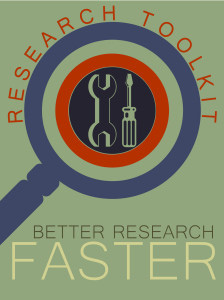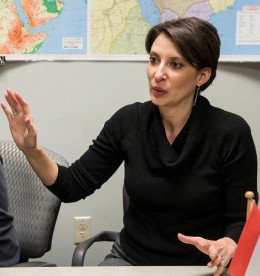 “Google Like a Pro.” “Detecting CRAAP.”
“Google Like a Pro.” “Detecting CRAAP.”
These are among the workshops now being offered at Wright State’s Dunbar Library as part of a pioneering program designed to help students develop and strengthen their research skills.
“We all think we’re great at research because we know how to Google things,” said Mandy Shannon, coordinator of library instruction and assessment. “But those skills don’t necessarily translate into doing academic research.”
Shannon said doing academic research today is completely different than it once was, when information was largely confined to bound journals and the problem was finding enough of it.
“Now students are inundated with information; it’s very overwhelming,” she said. “The challenge is how to filter it out, how to find what’s appropriate, how to understand how to use it in a way that contributes to your research.”
The library’s Reference and Instruction Department librarians work with students from the various academic disciplines to help them learn how to find, access, analyze and use information. For example, Shannon is the librarian for political science, social work and women’s studies among others.
“The most important thing for students to know is that they are not on their own; we are here to help,” said Shannon.
The library developed the workshops following the findings of Project Information Literacy, a national study led by the University of Washington on the research skills of first-year college students.
“It was very telling,” said Shannon. “What it found was that overwhelmingly when students come to college they have no experience writing research papers.”
The study also found that students generally thought they were better at doing research than they actually were and that faculty members think students arrive at college with research skills already in place.

Mandy Shannon, coordinator of library instruction and assessment, and the Wright State University Libraries offer Research Toolkit: Better Research Faster, a series of workshops designed to improve students’ research skills.
The Dunbar Library’s own assessment confirmed the findings of Project Information Literacy.
So the library developed the workshops — under the title Research Toolkit: Better Research Faster — to address the areas of most concern.
The workshops include an introduction to library services and how to Google Like a Pro, which explains how to use the search engine more surgically and effectively by filtering the information.
“It’s teaching people how to narrow down what it is they’re looking for so they can get the right results faster,” Shannon said.
Workshops also introduce students to scholarly databases, teach them how to read a scholarly article and how to find information based on citations.
Detecting CRAAP (Currency, Relevance, Authority, Accuracy and Purpose) gives students the criteria they should be thinking about when they use unfamiliar sources.
The library conducted a total of 28 workshops last fall, with an average of seven students attending each one. Those who attended said they better understood research concepts and felt more comfortable with how to apply them.
Scott L. Bruce, assistant professor and director of research for the Athletic Training Program, recommended that the 48 students in his classes attend the workshops to expand their knowledge of research methods, reinforce their existing knowledge about research and give some of the students a head start on next year’s requirements.
The students are asked in class to research everything from the injury rate in intramural sports to the impact of athletic training facilities on the number of injuries.
“The workshops made it easier for them to navigate the information the library has to offer, search the literature and demonstrate better ways to cite the research,” Bruce said.
Shannon said information literacy is a growing requirement among employers.
“Employers are not necessarily interested in having employees who know a lot of facts. They are interested in employees who are good at critical thinking, who can do research and solve problems,” she said. “All of these things are developed by good research.”
The workshops are free and open to all students, including graduate students. Each of the nine different workshops lasts under an hour, is built into the same time blocks as classes and offered on differing days and times. Registration is required.
Students can attend as many of the workshops as they like. Each workshop stands on its own — it is not necessary to attend the workshops in any sequential order and there is no requirement to attend one workshop before attending another.
Last November, Wright State librarians explained how they developed and implemented the research workshops to a conference of the Academic Library Association of Ohio.
“It was a packed room; we had people sitting on the floor in the back,” Shannon recalled. “Librarians at other universities became very interested in how they could adapt the workshops for their own purposes. These are universal challenges.”
Universities expressing interest by calling Wright State have included the University of Dayton, Ohio University and Cleveland State University. Others have downloaded the workshop content online, including the University of Missouri, the University of Georgia and universities in France, Australia and South Africa.
For more information, contact the University Libraries’ information desk at (937) 775-2925, Ask A Librarian or visit the University Libraries blog.

 Wright State celebrates Student Success Champions
Wright State celebrates Student Success Champions  Wright State gold team captures 2024 Horizon League team title, Flynn individual champion
Wright State gold team captures 2024 Horizon League team title, Flynn individual champion  118 medical students to graduate from Wright State’s Boonshoft School of Medicine April 28
118 medical students to graduate from Wright State’s Boonshoft School of Medicine April 28  Wright State University continues to demonstrate its financial strength with another credit rating upgrade from Moody’s
Wright State University continues to demonstrate its financial strength with another credit rating upgrade from Moody’s  Thousands celebrate the end of Spring Semester with food, fun and friendship
Thousands celebrate the end of Spring Semester with food, fun and friendship 